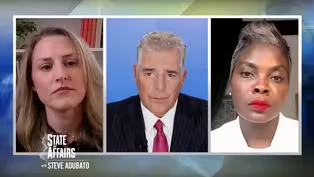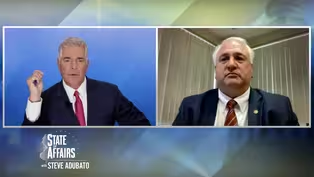State of Affairs with Steve Adubato
Transparency in Government and NJ's Fiscal Year 2025 Budget
Clip: Season 8 Episode 12 | 8m 53sVideo has Closed Captions
Transparency in Government and NJ's Fiscal Year 2025 Budget
Nicole Rodriguez, President of New Jersey Policy Perspective, joins Steve Adubato to discuss NJ's Fiscal Year 2025 Budget and the importance of transparency in government.
Problems playing video? | Closed Captioning Feedback
Problems playing video? | Closed Captioning Feedback
State of Affairs with Steve Adubato is a local public television program presented by NJ PBS
State of Affairs with Steve Adubato
Transparency in Government and NJ's Fiscal Year 2025 Budget
Clip: Season 8 Episode 12 | 8m 53sVideo has Closed Captions
Nicole Rodriguez, President of New Jersey Policy Perspective, joins Steve Adubato to discuss NJ's Fiscal Year 2025 Budget and the importance of transparency in government.
Problems playing video? | Closed Captioning Feedback
How to Watch State of Affairs with Steve Adubato
State of Affairs with Steve Adubato is available to stream on pbs.org and the free PBS App, available on iPhone, Apple TV, Android TV, Android smartphones, Amazon Fire TV, Amazon Fire Tablet, Roku, Samsung Smart TV, and Vizio.
Providing Support for PBS.org
Learn Moreabout PBS online sponsorship[INSPRATIONAL MUSIC STING] - We're now joined by Nicole Rodriguez, President of New Jersey Policy Perspective.
Their website will be up as Nicole tells us about the organization.
Nicole, thanks for joining us.
- Thank you.
It's a pleasure.
- You got it.
The mission of New Jersey Policy Perspective is?
- We are a think and do tank, and we focus on state level policies that lift up economic, racial, and social justice for research.
- Got it.
Let's start with this.
We were gonna talk about in depth private school vouchers, but the whole idea has been scrapped, as I understand it, in the State House right now.
- Yes.
- Why does your, the organization, New Jersey Policy Perspective, even, say the issue comes back up again.
It's been around a long time.
It'll come back again.
- Yeah, yeah.
- Why are you so, you and your colleagues, against the idea of private school vouchers, particularly in urban areas where some parents are looking for options?
- Of course, and that makes a lot of sense.
We absolutely understand that position.
Where we view it from a systematic overview, a landscape overview, the proposal that essentially had died a week ago would fund public dollars to private schools.
And that's where we have the issue.
Our schools are not fully funded at the moment.
There's such incredible need- - Our public schools.
Our public schools are not fully funded.
- Correct.
There's a lot of needs across the schools.
There are schools that don't even have nurses.
So once we're able to fully fund schools and not have to worry about revenue on top of all of this, and I believe is one of the reasons why this bill did not move forward is because we don't have the revenue to support it.
- Okay.
Shift gears.
We've talked to a whole range of people.
We've been taping all day today, and we've been asking people about the Open Public Records Act, otherwise known as OPRA.
- Yeah.
- The fact that the governor, on June 5th, we're taping later in the month of June.
It'll be seen later.
The governor signed legislation that significantly changes OPRA.
Very much, your organization, very much, excuse me, against the governor signing the changes to the Open Public Records Act because?
- Well, it reduces transparency.
So, you know, one of the main issues that we had with this bill is that it allows agencies to sue requesters, which is a brand new thing, as well as prohibiting requesters from requesting information from multiple agencies.
And we see this, the need for that is incredible for, you know, not only for journalists, but researchers and also community members who wanna know what's going on in their communities.
And this all public information, and they do have a right to know.
And having someone, being able to be sued will have a chilling effect on people who are trying to seek this information.
- Some who we've talked to in in-depth interviews, they have argued that the Open Public Records Act, as previously constituted, was being abused by some people who are really going after records, and the expense of the process was really hurting local budgets, and that information, which was ultimately received, was put out there for proprietary purposes to make money.
- Right.
Yes!
- Would you agree there's some abuses to OPRA as it's been instituted?
- Yes, we should always listen to what officials at the local level are experiencing, and this is why we don't feel that this result was actually solving a problem.
Because those bad requesters, these bad actors, are not gonna be deterred by the law.
They can afford to get sued.
And they can find ways to get this information because they don't have that chilling effect.
In addition to that, we've heard folks at the local level where they have the opposite problem.
It takes a long time for them to actually get these records because nothing is digitized.
So we would, what we would hope that this law would've been is to provide funding so that, you know, workers don't have to go through actual physical paper to find the information that the public is looking for.
- Another issue, the corporate transit tax, what is it, explain to folks very briefly what it is, and why, again, New Jersey Policy Perspective has real concerns about it.
Please.
- So the corporate business tax was a two and a half percent fee on corporations earning over $1 million in net profits.
This expired.
The governor proposed a corporate transit fee, which is essentially very similar to that original program.
- Over $10 million?
- Over $10 million, and 80% of those corporations are not even headquarter in New Jersey.
Vast majority are outta state.
- And the position of New Jersey Policy Perspective on that is what?
- So we're facing a fiscal cliff.
We need all the revenue that we can get.
- At New Jersey Transit?
- For New Jersey Transit especially.
New Jersey Transit right now will be experience $1 billion deficit, and this will bring in about $1 billion solving that crisis.
But that is just- - So it's a good idea?
It's a good idea.
- Yes, absolutely.
- And when leaders- - These are corporations who profited off the backs of people during the pandemic, and most are outta states.
These are the Amazons, these are not the mom and pop shops.
- So when you have business leaders, including the head of the New Jersey Business and Industry Association, and we did an interview with her, Michele Siekerka.
You should check it out.
You'll see our website come up on there.
Check it out.
She said, "You know, Steve.
The last thing we need is another tax on corporations.
People don't wanna come here in the first place.
They don't wanna stay."
- Well, that's not true.
- You say what?
- Well, if you actually look at the data, that's absolutely not true.
Our population is growing.
And, at the same time, these are not mom and pop shops.
This would reinstate a tax that already existed for many years.
So it's not an additional tax.
- But didn't the governor promise that he would let it- - They are federal taxes that they've had privileged in not even having to pay for many, many years under the Trump Administration.
- But the governor did promise he would not renew the tax, and now there's a different tax, but some of the business- - It's more targeted.
- Excuse me?
- It's more targeted.
- Okay.
- To the ultra wealthy corporations who can afford it.
- Last question, since we're talking about taxes, the Stay NJ Property Tax Program, your concerns about it are what?
- So the idea of this is wonderful.
You know, it has a noble goal of helping seniors stay in their home.
But if you actually look at the details, this is a $2 billion program, and it essentially, overwhelmingly, benefits wealthier seniors, and it does nothing with the one in four seniors who are living in rental properties.
- Not middle class New Jerseyans.
They don't benefit.
- It's mostly wealthy folks.
- Nicole Rodriguez is the president of New Jersey Policy Perspective.
Nicole, we thank you so much for joining us.
We appreciate it.
- Thank you so much.
Take care.
- You got it.
Steve Adubato, thank you so much for watching.
We'll see you next time.
- [Narrator] State of Affairs with Steve Adubato is a production of the Caucus Educational Corporation.
Celebrating 30 years in public broadcasting.
Funding has been provided by RWJBarnabas Health.
Let’s be healthy together.
PSE&G, Valley Bank.
The Turrell Fund, a foundation serving children.
The New Jersey Economic Development Authority.
The Port Authority of New York and New Jersey.
The Adler Aphasia Center.
NJ Best, New Jersey’s five-two-nine college savings plan.
And by The Fidelco Group.
Promotional support provided by Meadowlands Chamber.
And by New Jersey Monthly.
- (Narrator) Since 1903, PSEG has worked to keep our commitment to customers and communities, to keep your lights on and homes warm.
We’re there when challenges strike like storms or economic uncertainty.
We're preparing for tomorrow by working to replace aging infrastructure, provide carbon free nuclear energy, and deliver energy efficient options to customers.
PSEG, powering progress.
How The Family Connects NJ Program Helps Mothers & Babies
Video has Closed Captions
Clip: S8 Ep12 | 9m 52s | How The Family Connects NJ Program Helps Mothers & Babies (9m 52s)
VP of IUOE Local 825 Addresses The Future of AI
Video has Closed Captions
Clip: S8 Ep12 | 9m 28s | VP of IUOE Local 825 Addresses The Future of AI (9m 28s)
Providing Support for PBS.org
Learn Moreabout PBS online sponsorship
- News and Public Affairs

Top journalists deliver compelling original analysis of the hour's headlines.

- News and Public Affairs

FRONTLINE is investigative journalism that questions, explains and changes our world.












Support for PBS provided by:
State of Affairs with Steve Adubato is a local public television program presented by NJ PBS

